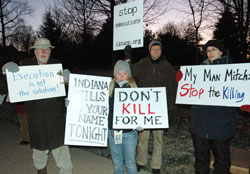Death penalty opponents protest Wrinkles’ execution

Amnesty International members Jared Carter of Indianapolis, from left, Ashley Kincaid of Avon, Michael Hartt of Indianapolis and Karen Burkhart, the Indiana death penalty abolition coordinator for Amnesty International and member of St. Susanna Parish in Plainfield, hold signs on Dec. 10 in front of the Governor’s Residence in Indianapolis indicating their opposition to capital punishment and the execution of Matthew Wrinkles. (Photo by Mary Ann Wyand)
By Mary Ann Wyand
Several death penalty opponents stood in the darkness, braced against the bitter cold, in front of the Governor’s Residence in Indianapolis late on Dec. 10 during a pro-life vigil to peacefully protest the execution of death-row inmate Matthew Eric Wrinkles early on Dec. 11 at the Indiana State Prison in Michigan City, Ind.
The 49-year-old Evansville, Ind., man—who was convicted of killing his wife, her brother and her sister-in-law on July 21, 1994, while high on methamphetamine—had not requested clemency, and Gov. Mitch Daniels did not grant a last-minute commutation of his death sentence to life in prison without parole.
Wrinkles died at 12:39 a.m. on Dec. 11 from a lethal injection administered by prison officials.
Even though they knew that Wrinkles would almost certainly be executed in a few hours, the demonstrators still stood undeterred in the frigid winter night in front of the Governor’s Residence at 4600 N. Meridian St., holding pro-life signs for drivers and other passersby to read and, hopefully, remember, reflect on and be inspired to take action to help end the state’s practice of executing convicted murderers.
“He hasn’t asked for clemency,” acknowledged St. Susanna parishioner Karen Burkhart of Plainfield, the Indiana death penalty abolition coordinator for Amnesty International since 1978, as she stood bundled up against the freezing wind.
“Not asking for [clemency] and not wanting it are two different things,” she said. “I would expect that he would accept [life in prison without parole] if it was offered.”
Burkhart held a handmade sign that read “My man Mitch, stop the killing.”
“I understand that his kids would like it if he wasn’t executed,” she said. “They are really upset about it, and they were affected horribly by this [murder of their mother, aunt and uncle]. They have already lost their mother, and now the state is going to make them orphans. Taking his life isn’t going to bring back their mom. It’s just going to cause more pain and suffering for the family.”
The temperature was below freezing, Burkhart said, but “Jesus is right by my side. I know he’s here with all the people that are here. He’s coming to say, ‘It’s not OK to do this. We shouldn’t be killing people in anyone’s name.’ ”
Indiana University-Purdue University Indianapolis student Ashley Kincaid of Avon, who is a member of Amnesty International, held a sign that read “Don’t kill for me.”
She is studying psychology and criminal justice at IUPUI, and plans to complete law school then represent indigent death-row inmates as a public defender at the appellate court level.
“I want to help the people that can’t help themselves, and that no one else is willing to help,” Kincaid said. “I believe that all life is sacred and that justice shouldn’t have a price tag. I feel that the death penalty is wrong. It re-victimizes people. … I want people to know that tonight’s killing will not be in my name.”
After the one-hour evening vigil in front of the Governor’s Residence, Kincaid traveled to Michigan City to join a late-night vigil outside the prison with members of the Indiana Coalition Acting to Suspend Executions (InCASE).
Jared Carter of Indianapolis, also a member of Amnesty International, held a sign that read “Execution is not the solution.”
“I hope we can see through to abolishing the death penalty in Indiana,” Carter said. “We’re the last major Western country to conduct such executions. Almost all the civilized countries have foregone it. … Any time you decide to take another human’s life, arbitrarily or for some reason you manufacture, you’re assuming God-like powers, which you don’t have.” †
